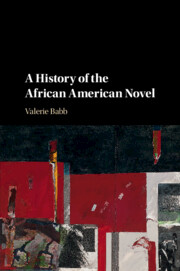Book contents
- Frontmatter
- Dedication
- Epigraph
- Contents
- List of Illustrations
- Acknowledgments
- PART I HISTORY
- Introduction: The Problem with the Title of this Volume
- 1 Out of Many One: The Beginnings of a Novelistic Tradition, 1850s– 1900s
- 2 Publish or Perish: African American Novels, 1900s– 1920s
- 3 Aesthetics of Race and Culture: African American Novels, 1920s– 1940s
- 4 Home of the Brave: African American Novels, 1940s– 1960s
- 5 Black Arts and Beyond: African American Novels, 1960s– 1970s
- 6 From Margin to Center: African American Novels, 1970s– 1990s
- 7 “Bohemian Cult Nats”: African American Novels, 1990s and Beyond
- PART II SIGNIFICANT GENRES OF THE AFRICAN AMERICAN NOVEL
- Coda
- Appendix
- Notes
- Works Cited
- Index
6 - From Margin to Center: African American Novels, 1970s– 1990s
from PART I - HISTORY
Published online by Cambridge University Press: 28 July 2017
- Frontmatter
- Dedication
- Epigraph
- Contents
- List of Illustrations
- Acknowledgments
- PART I HISTORY
- Introduction: The Problem with the Title of this Volume
- 1 Out of Many One: The Beginnings of a Novelistic Tradition, 1850s– 1900s
- 2 Publish or Perish: African American Novels, 1900s– 1920s
- 3 Aesthetics of Race and Culture: African American Novels, 1920s– 1940s
- 4 Home of the Brave: African American Novels, 1940s– 1960s
- 5 Black Arts and Beyond: African American Novels, 1960s– 1970s
- 6 From Margin to Center: African American Novels, 1970s– 1990s
- 7 “Bohemian Cult Nats”: African American Novels, 1990s and Beyond
- PART II SIGNIFICANT GENRES OF THE AFRICAN AMERICAN NOVEL
- Coda
- Appendix
- Notes
- Works Cited
- Index
Summary
Although nearly half of all English departments require a course in Shakespeare for their majors, I would bet that The Color Purple is taught in more English courses today than all of Shakespeare's plays combined. Those who maintain that Alice Walker, though well worth reading, has in comparison with Shakespeare less to show us about people, societies, and the possibilities of language (a highly defensible standard of literary merit) must accustom themselves to being called “elitists” – an accusation beside which even the terms “racist” and “sexist” have paled into blandness. (Clausen 52)
As what was popularly termed the culture wars reached their height in the 1970s–1990s, critics and self-styled aesthetes argued that writers whose works engaged civil, women's, lesbian and gay rights, and did so with forms deemed unaesthetic, were incapable of creating a “universal” literature and were eroding academic excellence. In addition to Christopher Clausen, quoted above, Dinesh D'Souza in Illiberal Education (1991) feared that Homer, Aristotle, and Shakespeare were being exiled to make room for Toni Morrison, Alice Walker, and Ntozake Shange. William Bennett and Lynne Cheney would join the chorus, bemoaning the eschewing of classic literature for the literature of identity politics. Self-acclaimed protectors of scholarly and artistic rigor were on the defensive against attempts to create a more representative canon. Hershel Parker's assessment of the 1990 edition of the Heath Anthology of American literature shows how readily efforts to broaden conceptions of canonical literature were chastened with the yardstick of literary merit: “The most visible innovations in the Heath anthology are the new selections by writers from racial minorities, especially blacks and Indians – selections where literary merit has plainly not always been the chief criterion” (15). Parker was editor of multiple editions of the Norton Anthology of American Literature. While no one would dispute his right to his assessment, the ready equation of race and artistic inferiority makes one question the unstated values behind standards of literary evaluation.
- Type
- Chapter
- Information
- A History of the African American Novel , pp. 155 - 188Publisher: Cambridge University PressPrint publication year: 2017



